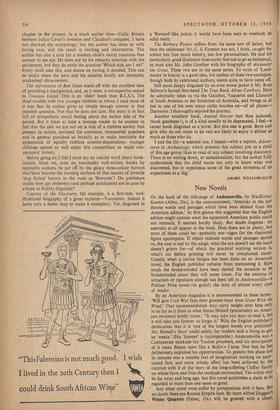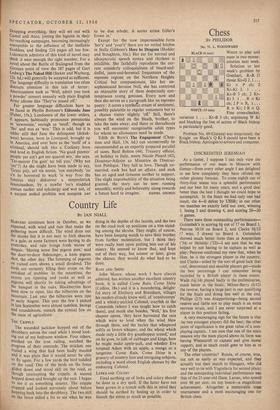New Novels
ON the back of the title-page of Andersonville, by MacKinlaY Kantor (Allen, 20s.), is the announcement, 'Asterisks in the text denote words and passages which have been deleted from the American edition.' At first glance this suggested that the English edition might contain what the squeamish American public could not stomach. It seemed hardly likely. But doubt lingered : no asterisks at all appear in the book. Dots there are in plenty, but most of these could be—probably are—signs for the rhetorical figure aposiopesis. If others indicate words and passages denied us, the case is met by the adage, what the eye doesn't see the heart doesn't grieve for—of which the practical working version is, what's cut before printing will never be complained about. Usually when a latrine fatigue has been done on an American novel, the English publisher refrains from mentioning it. How much the broad-minded have been denied the occasion to be broadminded about they will never know. For the exercise of attraction or repulsion enough has been left in Andersonville--a Pulitzer Prize novel—to gratify the taste of almost every class of reader.
By an American magazine it is recommended in these terms: Will give Civil War fans their greatest hour since Gone With the Wind.' That recommendation may carry weight over here only in so far as it hints at what James Hutsell (presumably an Ameri- can reviewer) boldly states: "It may take you days to read it, but it will take you forever to forget it.' With the English publisher's declaration that it is 'one of the longest hovels ever published, Mr. Hutsell's 'days' could safely, for readers with a living to gets be 'weeks.' (His 'forever' is incomputable.) Andersonville was a Confederate stockade for Yankee prisoners, and his descriptions of it make Belsen seem like a Butlin's Camp. Not that he has deliberately exploited his opportunities. To present this place and its inmates was a notable feat of imagination working on ascer• tained fact, and some artistic effect has been achieved by the contrast with it of the story of the long-suffering Claffey family on whose farm and lives the stockade encroached. The action maY be far away and long ago, but this novel establishes a claim to be regarded in more than one sense as great. Any other novel must suffer by juxtaposition with it here. But no doubt there are Roman Empire fans. By them Alfred Duggan 'S Winter Quarters (Faber, 15s.) will be greeted with a cheer, Dropping everything, they will set out with Camul and Acco, joining the legions in their far4reaching campaigns, becoming increasingly susceptible to the influence of the ineffable Goddess, and finding 224 pages all too few. Lukewarm admirers of this kind of novel may think it near enough the right number. For a novel about the Battle of Stalingrad from the German point of view the 187 pages of Gert Ledwig's The Naked Hill (Seeker and Warburg, 12s. 6d.) will generally be accepted as sufficient. The language difficulty in translation too often distracts attention in this tale of terror: Americanisms such as 'Well, admit you took a powder' consort uneasily with plain English Army idioms like 'They've pissed off.'
Far greater language difficulties have to be faced in Phyllis Bottome's Eldorado Jane (Faber, 15s.). Londoners of the lower orders, It appears, habitually pronounce pneumonia as 'newmonia,' enough as 'enuff,' though as tho' and was as 'woz.' This is odd, but it is odder still that Jane the delinquent (delink- !vent) heroine, born in Liverpool, brought up In America, and over here as the 'moll' of a criminal, should talk like a Cockney born and bred in English fiction. 'No good pizenin' people yer ain't got ner quarrel wiv,' she says. Ter-morrer I'm goin' ter tell you.' (Why not .yer'?) As she might have been made to say, Grate pity, orl vis seems, 'cos ennybody 'oo 01 be bovvered to wurk 'is way froo the funetics may diskuvver a simperfettick iksaminashun, by a nawfer 'oo's studdied Yuman nacher and sykolergy and wot not, of a nurjent soshul problim wot sumpink awt to be dun erbaht. A sorter crime friller's frown in.'
Except for the now impermissible form 'her's' and 'your's' there are no verbal hitches in Stella Gibbons's Here be Dragons (Hodder and Stoughton, 16s.). Her ear for normal and idiosyncratic speech syntax and rhythms is infallible. She faithfully reproduces the cur- rent outsiderly colloquialisms of beard-and- duffel, jeans-and-horsetail frequenters of the espresso regions on the Northern Heights. Critical but compassionate, like her un- sophisticated heroine Nell, she has contrived an enjoyable story of these desperately con- temptuous young geniuses. Every now and then she serves us a paragraph like an espresso pastry: it oozes a synthel'ic cream of sentiment, possibly palatable to regular customers but to a chance visitor slightly 'off.' Still, there's always the wind on the Heath, brother, to take the taste away; and there or thereabouts you will encounter recognisable adult types for whom no allowances need be made.
Edith de Born's The Engagement (Chap- man and Hall, 13s. 6d.) can unreservedly be recommended as an expertly prepared parallel of cases. Basil Bolton (44), Treasury official, on holiday in Italy, meets Nicole Picard (42), Directeur-Adjoint au Ministere de l'lnstruc- tion Publique. They fall in love. Though un- married, each has had an a/faire, and each has an aged and tiresome mother to support. The slight improbability of the situation being granted, the story can be seen running smoothly, wittily and believably along towards
a future bard to imagine. DANIEL GEORGE











































 Previous page
Previous page